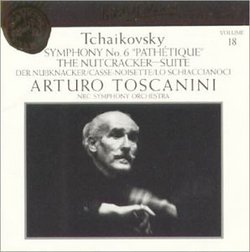| All Artists: Pyotr Il'yich Tchaikovsky, Arturo Toscanini, NBC Symphony Orchestra Title: Toscanini Collection, Vol. 18 Tchaikovsky: Symphony 6 / Nutcracker Suite Members Wishing: 0 Total Copies: 0 Label: RCA Release Date: 9/15/1992 Genre: Classical Style: Symphonies Number of Discs: 1 SwapaCD Credits: 1 UPC: 090266029723 |
Search - Pyotr Il'yich Tchaikovsky, Arturo Toscanini, NBC Symphony Orchestra :: Toscanini Collection, Vol. 18 Tchaikovsky: Symphony 6 / Nutcracker Suite
 | Pyotr Il'yich Tchaikovsky, Arturo Toscanini, NBC Symphony Orchestra Toscanini Collection, Vol. 18 Tchaikovsky: Symphony 6 / Nutcracker Suite Genre: Classical
|
Larger Image |
CD Details |
CD ReviewsToscanini plays Tchaikovsy masterpieces Robert E. Nylund | Ft. Wayne, Indiana United States | 02/23/2006 (4 out of 5 stars) "Arturo Toscanini (1867-1957) was very selective in programming the music of Peter Tchaikovsky, so the pieces he played were ones that he really admired. He once said of Tchaikovsky's final symphony, named the "Pathetique" by the composer's brother Modeste (and approved by Peter himself), that it is "honest music."
The sixth symphony was the final work the composer completed and he conducted the world premiere in October 1893. Once again, eyewitnesses (including the young composer Igor Stravinsky) remarked that Tchaikovsky was very nervous and uncertain. He never really liked to conduct and, on that occasion, he apparently was more apprehensive than before. No one could have imagined that it would be his final public appearance. Whatever the actual circumstances, it is known that Tchaikovsky drank a glass of unboiled water during a cholera epidemc and he contracted the usually fatal disease, dying only days after the premiere at the age of 53. Many believe that the sixth symphony is autobiographical. It is certainly unlike anything else the composer wrote. It begins with in a very somber, quiet, rather brooding manner. Toscanini's November 24, 1947, recording in Carnegie Hall fully captures the drama of this movement. Soon, the music becomes very loud and very turbulent. Toscanini's interpretation is quite powerful, even if some purists have said it is not right. It is probably closer to the composer's intentions, however, because Toscanini always tried to bring to life what the composer wanted. This 1947 recording is undoubtedly the best performance the NBC Symphony under Toscanini gave; the famous stereophonic recording of March 21, 1954, has a terrible blunder in the first movement and much of the playing is said to be lackluster. That is certainly not the case in this performance, which rivals the one Toscanini recorded with the Philadelphia Orchestra a few years earlier. The second movement is a bizarre waltz, written in 5/4 time rather than the usual 3/4 time. Tchaikovsky had been known for his waltzes and this has a strange beauty. The offbeat, of course, creates a sense of mystery and uncertainty. Toscanini brings grace to the music, while still maintaining the underlying troubles that Tchaikovsky portrayed. The third movement is an almost grotesque march. A friend complained of this performance, as well as Furtwangler's 1951 concert performance with the Berlin Philharmonic (available on Deutsche Grammophon). However, Toscanini understood that the seeming triumph of the music is rather forced. There is clearly some irony in this because Tchaikovsky had so often written spectacular finales, with crashing cymbals and pounding tympani. Perhaps the triumph is over the fact that Tchaikovsky had succeeded, even as he questioned his only musical abilities at times. The symphony almost seems to be coming to an end and many audiences have been tricked into applauding at the conclusion of the third movement, only to discover there is much more to be heard. The fourth movement is clearly an elegy or a dirge. There is definitely a funereal quality to the music, which is so filled with tragedy and despair. Toscanini pulls out all of the stops and capturing the terrible emotions as the composer seems to cry and even scream at his fate. Earlier Tchaikovsky had often represented fate in his music, much like Beethoven did in confronting his increasing deafness, but now the situation had become so overwhelming that Tchaikovsky could no longer cope with it. Little wonder that many suspect Tchaikovsky deliberately drank that unboiled glass of water that ultimately killed him. This recording was made in Carnegie Hall with the microphones set well back in the auditorium. For the most part, it worked quite well, even if some details were missed during the softer passages. Digital remastering, of course, has greatly improved the sound from the original 78-rpm discs. Four years later, again in Carnegie Hall, Toscanini conducted the very familiar first suite from Tchaikovsky's last ballet, "The Nutracker." It is amazing that Toscanini could take music that is so well known and bring new life to it. This November 19, 1951, recording clearly rivals Stokowski's 1953 recording with New York musicians (also made for RCA Victor). All of the magic, the joy, the delight, and the mystery are present, from the wonderful miniature overture to the triumphal "Waltz of the Flowers." " |

 Track Listings (12) - Disc #1
Track Listings (12) - Disc #1